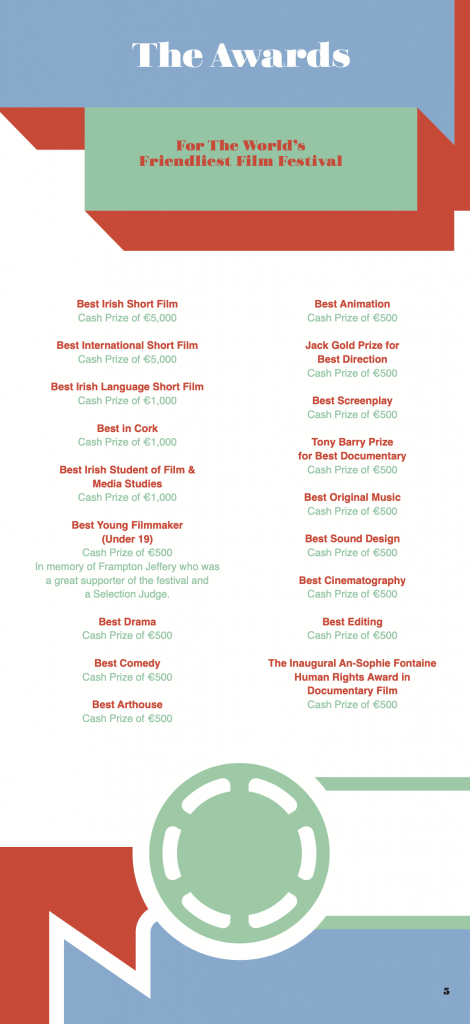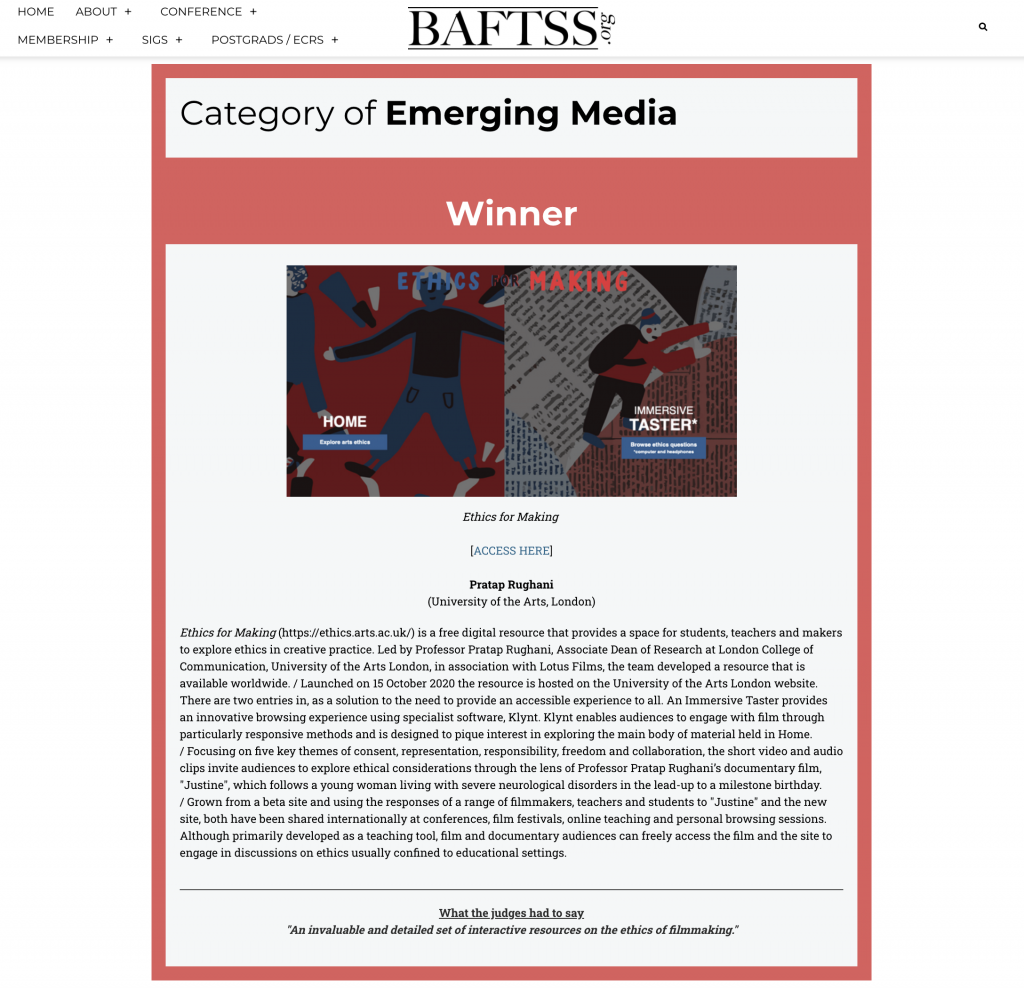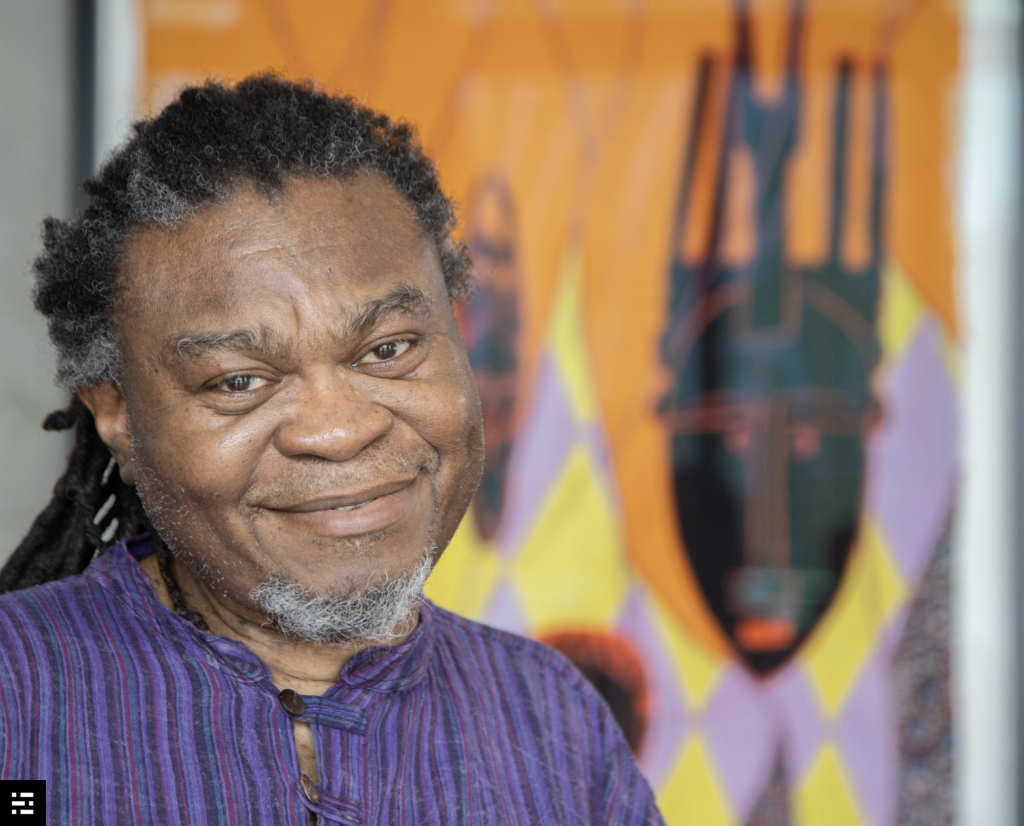Pratap Rughani moderated the Keynote by Ene-Liis Semper and Mikko Duffva: Touch of Reality & New Futures on Thursday 9 June at the ELIA Leadership Symposium “Surfing Uncertainties” in Tallinn, Estonia.
A link to the recording of the event is here.
Pratap Rughani moderated the Keynote by Ene-Liis Semper and Mikko Duffva: Touch of Reality & New Futures on Thursday 9 June at the ELIA Leadership Symposium “Surfing Uncertainties” in Tallinn, Estonia.
A link to the recording of the event is here.
Professor Rughani, along with students of MA Documentary Film at London College of Communication introduced the new human rights in documentary film award supported by the Screen School at London College of Communication, at the Fastnet Film Festival awards ceremony, on Saturday 28 May.

Pratap Rughani was one of the speakers on Day 1 of the Symposium, held in person at Chelsea College of the Arts, UAL and online.
Opening Panel: Setting the Scene
This session sets the scene by situating practice research in design in a broader context. It shares perspectives from academic fields and professional practice that use practice research to advance knowledge and develop responses to social and sustainability issues. What are the achievements and what has been learned from using this approach? What are the barriers and enablers to carrying out high quality practice research? What outcomes can practice researchers work towards?
Introduction and welcoming remarks: Professor David Mba, Deputy Vice-Chancellor, Research, Knowledge Exchange and Enterprise, UAL.
Chair: Professor Lucy Kimbell, Social Design Institute, UAL
Speakers:
Professor Harriet Hawkins, Department of Geography, Royal Holloway
Indy Johar, Dark Matter Labs
Professor Pratap Rughani, London College of Communication, UAL
Pratap Rughani contributed his essay “Towards Restorative Narrative” to a festschrift published by abramis academic publishing, edited by Richard Lance Keeble, to celebrate the late Dr Winston, The Lincoln Professor.
“This chapter argues for an experiment in bringing together moving image and mediation practices to create a more relational media – socially designed and biased enough to nurture the connective tissue between communities, drawing on practices from restorative justice including deep listening and searching for shades of grey. Meanwhile, swathes of social and mass media are increasingly polarised. Key production processes and financial structures feed this trend, magnifying the attitudes and algorithms that lean towards conflict. This trend hollows out the quality or sometimes the prospect of dialogue in the public sphere and threatens to break the connective tissue that forms the habitus of UK multi-cultures. In response to these issues, the chapter suggests some strategies to refuse and reverse toxic polarisation. It argues that the need for participatory and community media is stronger than ever and asks: what is needed to create meetings and media to build creative explorations that nurture empathic understanding, especially when we disagree? Finally, can the processes of restorative justice offer a model for ‘restorative narrative’ that could frame a new media genre of storytelling
designed to build mutual understanding and connection that obtains on either side of emotive issues whether or not we agree?”
Keywords: restorative narrative, polarisation, mass media, ethics
The book “brings together ten original essays by leading international academic colleagues to celebrate Brian Winston’s distinguished career begun in 1963. They cover three of Brian’s specialist areas:
The contributors are (in order of appearance) Tom Waugh, Deane Williams, Kate Nash, Annette Hill, Clifford G. Christians, Julian Petley, Raphael Cohen-Almagor, Ivor Gaber, Martin Conboy and Pratap Rughani.”
Lotus Films is delighted to announce that Ethics for Making, the free digital ethics resource in creative practice developed in conjunction with London College of Communication, University of the Arts London, won The British Association of Film, Television and Screen Studies (BAFTSS), Screen Based Practice Research Emerging Media Award 2022.
The project was led by Pratap Rughani, Professor of Documentary Practices, Associate Dean of Research London College of Communication, UAL, director of Lotus Films UK, and developed by Iris Wakulenko Digital and Project Manager in conjunction with the LCC post-graduate team Gareth Johnson, Digital Producer and Designer, and Virginie Tan, Interactive Designer, and was illustrated by Grace Dahl, graduate of Camberwell College of Arts, UAL.

Further reading:
London College of Communication launches ‘Ethics for Making’ in partnership with Lotus Films
Pratap Rughani was one of the film and television specialists on the judging panel for the Learning on Screen Awards in April.
The Awards were streamed this year and can be viewed here.
Pratap Rughani was one of the panel at the event for members of NERUPI, a partnership of over 70 higher education organisations working together to create a new approach to evaluation using the framework developed by Annette Hayton, University of Bath and Dr Andrew Bengry, Bath Spa University.
The importance of the arts, in all their forms, has become very clear during the pandemic. Whether it is through watching movies, taking up painting or a musical instrument or just missing live performance, the benefits of the arts to our well-being have been highlighted. Education plays a major role in fostering the arts but can also exclude many groups from participating and engaging. This event will explore these issues and consider how we can improve access and engagement with the creative and performing arts.
To explore these issues and more our panel of speakers are:
Hosting Ideas for Progress: highlights from the conversation between Yinka Shonibare CBE and Mark Sealy OBE, hosted by Professor Pratap Rughani.

“The tools for dialogue are in our pockets as never before, yet the social media we speak through has been capitalised and weaponised to such an extent that, for too many, social media speaks for us and speaks badly. Some marginalised communities embrace a new power to film and fight unacceptable realities, energising the same platforms. Yet, the rise of hate speech, social media’s treacherous shadow, threatens to hollow out democracy, tweet by Trumpian tweet. Until social media platforms reform, we are free to step back from being triggered and respond by de-escalating rather than polarisation”
Pratāp Rughani – “Design for Dialogue: Valuing Doubt in an Age of Conviction” UAL Social Design Institute publication
https://www.arts.ac.uk/ual-social-design-institute/publications